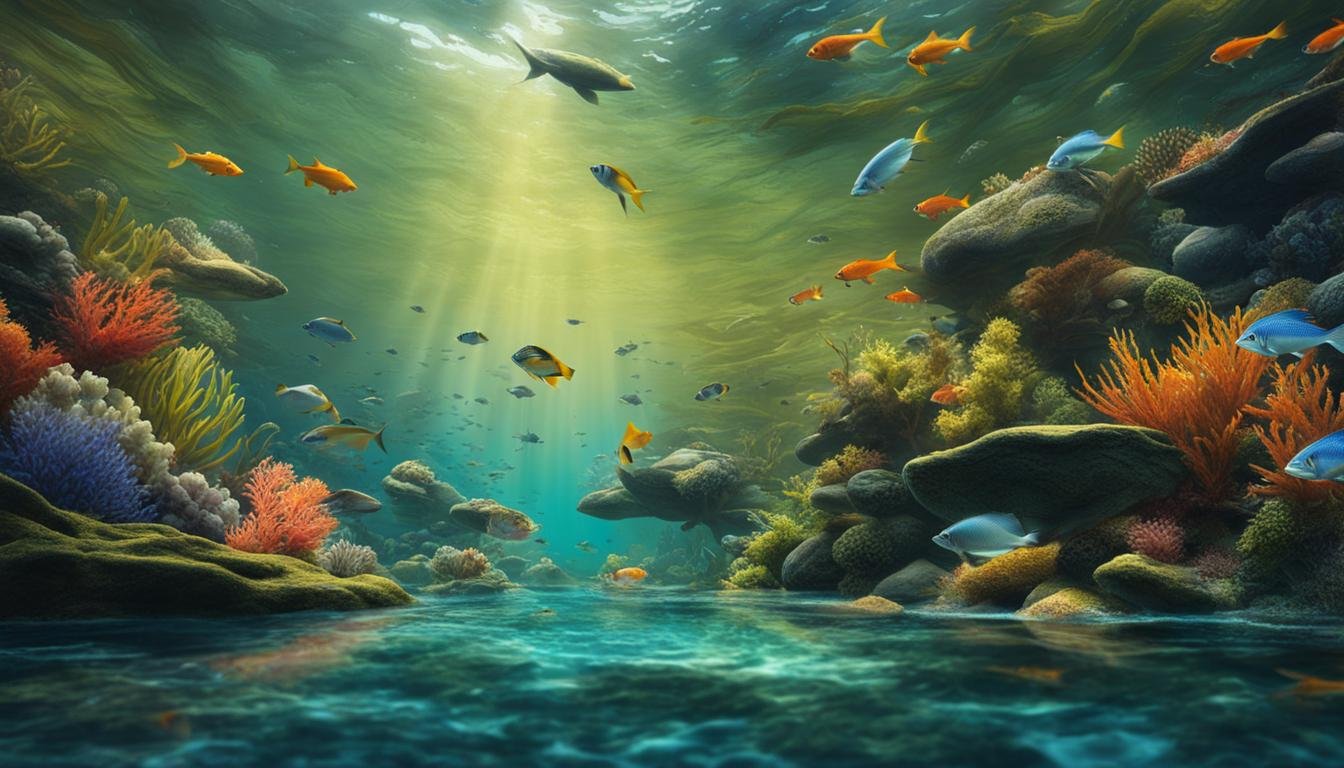How Long Do Fish Live? Fish lifespan is a topic that intrigues many people and plays a crucial role in understanding and protecting aquatic ecosystems.
In this article, we will explore the various factors that influence fish longevity, including genetics, environmental impacts, size, and metabolic rate. We will also delve into the lifespan of popular aquarium fish and discuss the differences between fish lifespan in captivity and the wild.
Additionally, we will examine the impact of diseases, parasites, and captivity on fish lifespan, as well as the extraordinary lifespan anomalies found in the fish world.
Finally, we will touch on conservation efforts and the phenomenon of aging in fish, providing a comprehensive overview of the fascinating world of fish life expectancy.
Key Takeaways:
- Fish lifespan is influenced by various factors such as genetics, environmental impacts, size, and metabolic rate.
- There are differences between fish lifespan in captivity and the wild.
- Diseases, parasites, and captivity can impact fish lifespan.
- Some fish species exhibit extraordinary lifespan anomalies.
- Conservation efforts play a vital role in preserving long-lived fish species.
Exploring the Lifespans of Various Fish Species
Fish species exhibit a wide range of lifespans, with some living only a few years while others can survive for decades or even centuries. Understanding the lifespans of different fish species provides valuable insights into their unique life cycles and the factors that contribute to their longevity.
In this section, we will delve into the lifespans of various fish species, including popular aquarium fish such as goldfish, guppies, bettas, and angelfish. We will also explore the lifespan of fish that inhabit specific ecosystems, such as deep-sea fish and freshwater fish.
By studying the lifespans of these diverse fish species, we can uncover fascinating patterns and gain a deeper understanding of the factors that influence fish longevity. From the small but mighty guppy to the majestic angelfish, each species has its own unique lifespan characteristics.
Aquarium Fish Lifespans
Many people keep aquarium fish as pets, and it is essential to understand the lifespan of popular species to provide them with appropriate care. Goldfish, for example, can live for several decades if given proper care and a suitable living environment. Guppies, on the other hand, typically have a lifespan of 1-2 years. Bettas and angelfish fall somewhere in between, with bettas living for 2-3 years and angelfish having the potential to live up to 10 years.
Lifespans in Unique Ecosystems
Fish that inhabit specific ecosystems also have varying lifespans. Deep-sea fish, residing in the dark and extreme depths of the ocean, face challenging conditions and often have shorter lifespans. In contrast, freshwater fish, such as certain species found in rivers and lakes, may have longer lifespans.
| Fish Species | Average Lifespan |
|---|---|
| Goldfish | Up to 30 years in captivity |
| Guppies | 1-2 years |
| Bettas | 2-3 years |
| Angelfish | Up to 10 years |
| Deep-sea Fish | Varies, some live up to 20 years |
| Freshwater Fish | Varies, some live up to 15-20 years |
Factors Affecting Lifespan
The lifespans of fish species are influenced by various factors, including genetics, environmental conditions, diet, reproductive strategies, and level of predation. Understanding these factors can help fish enthusiasts provide optimal care for their aquarium fish and contribute to the conservation and management of wild fish populations.
In the next section, we will explore the influence of genetics and environmental impacts on fish longevity, shedding light on the role of genetics in determining lifespan and how habitat conditions can affect fish lifespan. Join us as we delve deeper into the fascinating world of fish lifespan and uncover more insights into their incredible longevity.
Genetic and Environmental Impacts on Fish Longevity
When it comes to the lifespan of fish, both genetic and environmental factors play significant roles. Genetic factors contribute to the variability in fish lifespan, with some species exhibiting exceptionally long lifespans due to genetic traits. On the other hand, the habitat in which fish live has a profound impact on their longevity. Different environmental conditions, such as polluted or degraded environments compared to pristine habitats, can affect fish lifespan.
Influence of Genetics on Lifespan
Genetics play a crucial role in determining the lifespan of fish. Certain genetic factors can contribute to both longer and shorter lifespans in different fish species. For example, certain genetic mutations or adaptations can enhance the ability of fish to resist diseases or age-related changes, resulting in extended lifespans. Scientists have identified specific genes and genetic mechanisms that contribute to exceptional longevity in certain fish species, providing valuable insights into the genetic basis of fish lifespan.
The Role of Habitat in Fish Longevity
The habitat in which fish live has a profound impact on their longevity. Fish living in polluted or degraded environments may be exposed to various stressors that can negatively impact their lifespan. Water pollution, habitat loss, and other environmental stressors can weaken the health and resilience of fish populations, leading to shorter lifespans.
In contrast, fish living in pristine and well-protected habitats have access to clean water, abundant food sources, and suitable breeding grounds, which can contribute to longer lifespans.
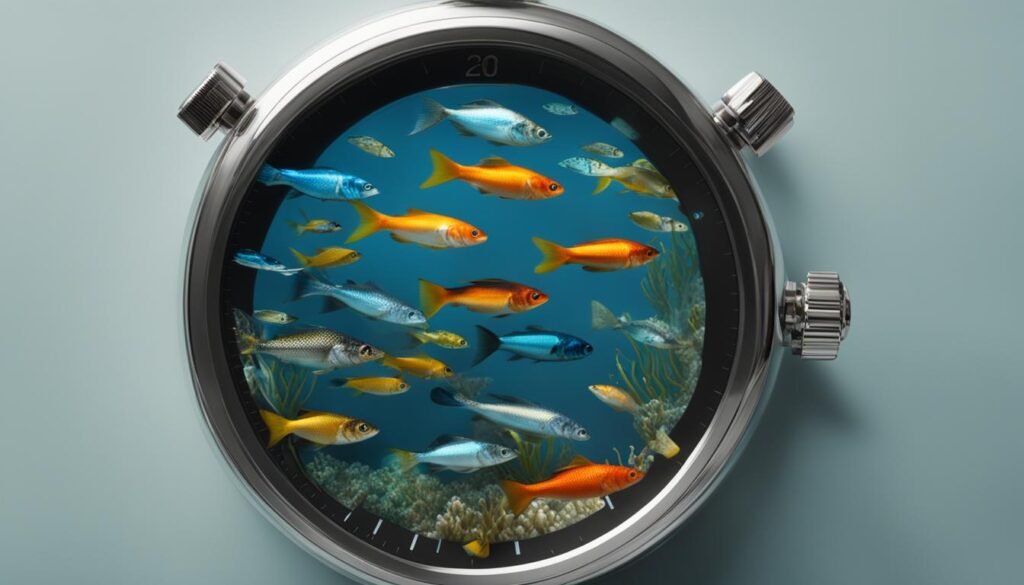
The longevity of these small fish species can be attributed to their unique adaptations which allow them to navigate their environment, evade predators, and find sources of sustenance more efficiently. Factors such as metabolism, reproductive strategies, and environmental conditions also play a significant role in their extended lifespan.
Understanding the lifespan of small fish species, including the world’s smallest fish, provides valuable insights into the wondrous diversity of aquatic life and challenges our preconceived notions about size and longevity.
| Small Fish Species | Average Lifespan | Main Factors Contributing to Longevity |
|---|---|---|
| Species 1 | 10 years | Adaptations for evading predators and finding food |
| Species 2 | 8 years | Efficient metabolism and reproductive strategies |
| Species 3 | 12 years | Optimal environmental conditions and ability to withstand stress |
Table: Lifespan and contributing factors of small fish species
By studying the unique lifespan characteristics of small fish, scientists can gain a deeper understanding of the intricate mechanisms that govern longevity in aquatic ecosystems. This knowledge serves as a foundation for conservation efforts and the preservation of these extraordinary creatures for future generations to appreciate.
Evolutionary Ancient Fish and Their Lifespan Secrets
Some fish species have remained relatively unchanged for millions of years, offering insights into the secrets of longevity. These ancient fish species, which have thrived through countless generations, provide valuable information for studying the aging process and enhancing our understanding of aquatic life cycles.
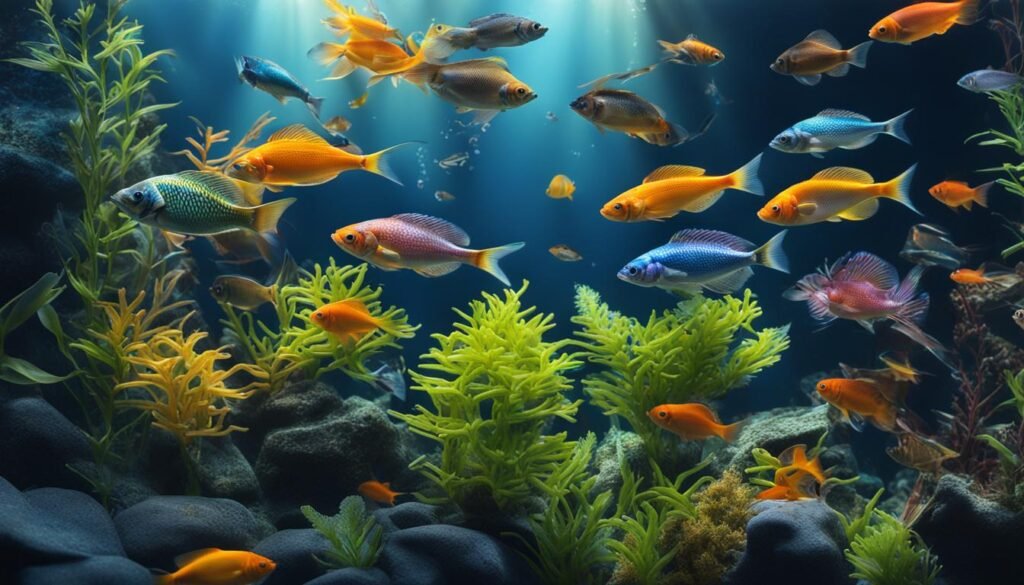
How Disease and Parasitism Affect Fish Lifespan
Diseases and parasites can have a significant impact on the lifespan of fish. When fish are affected by diseases, their life expectancy can be severely shortened. Similarly, parasite infestations can weaken fish, making them more susceptible to other diseases and reducing their overall longevity.
Common Diseases Impacting Fish Life Expectancy
There are several common diseases that can impact the life expectancy of fish. These diseases can affect different parts of the fish’s body, including their skin, fins, internal organs, and immune system. Some of the most common fish diseases include:
- Ichthyophthiriosis (Ich): A parasitic infection that causes white spots on the fish’s body.
- Columnaris: A bacterial infection that leads to the development of a white cotton-like growth on the fish’s skin and fins.
- Fin Rot: A bacterial infection that causes the deterioration of the fish’s fins, resulting in frayed or eroded fins.
- Dropsy: A condition characterized by the swelling of the fish’s body due to fluid accumulation.
- Mouth Fungus: A fungal infection that affects the fish’s mouth and can lead to ulcers and lesions.
- Gill Disease: A condition that affects the fish’s gills, leading to difficulty in breathing and reduced oxygen intake.
These diseases can have detrimental effects on fish health and reduce their overall lifespan.
Combating Parasites for a Longer Fish Life
Effective management and prevention of parasite infestations are crucial for preserving the longevity of fish. Here are some strategies for combating parasites and promoting a longer fish life:
- Regular monitoring: Keep a close eye on fish behavior, physical appearance, and overall health to identify early signs of parasite infestation.
- Quarantine new fish: Isolate new fish in a separate quarantine tank to prevent the introduction of parasites to an established aquarium.
- Proper tank hygiene: Maintain clean and well-filtered aquarium water, as poor water quality can weaken fish and make them more susceptible to parasites.
- Treatments and medications: Use appropriate medications and treatments recommended by veterinarians or aquatic specialists to specifically target and eliminate parasites.
- Provide a balanced diet: Proper nutrition strengthens fish immune systems, making them more resistant to parasites and diseases.
- Regular tank maintenance: Conduct regular tank cleanings and water changes to minimize the buildup of parasites and prevent disease outbreaks.
By implementing these strategies and promptly addressing diseases and parasites, fish owners can increase the lifespan of their aquatic companions and maintain healthier aquarium environments.
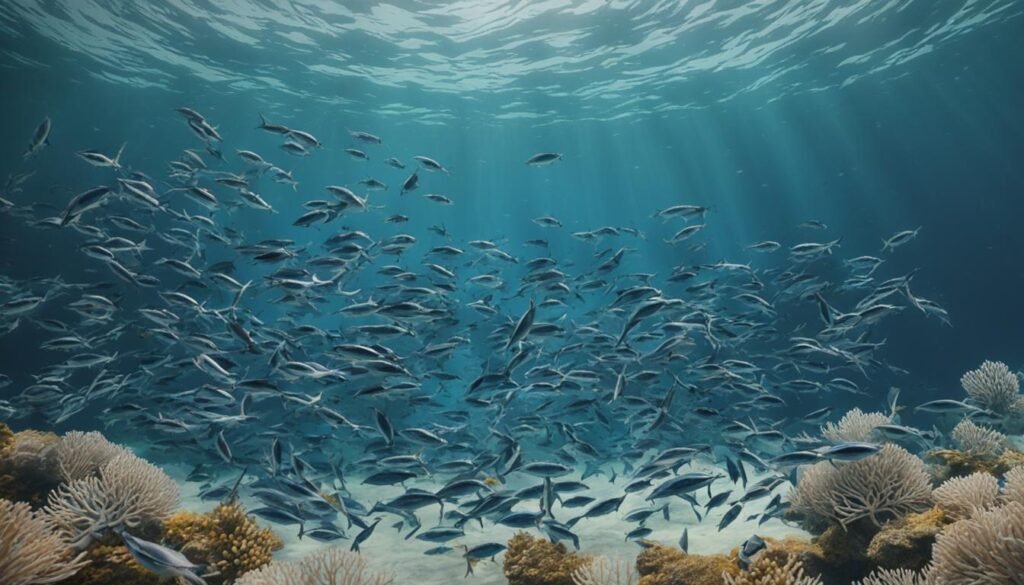
The Impact of Captivity on Fish Lifespan
Keeping fish in captivity, such as in home aquariums, can have varied effects on their lifespan. The transition from their natural habitat to an aquarium environment can introduce several factors that affect fish longevity. Understanding the impact of captivity on fish lifespan is crucial for providing the best possible care for aquarium fish.
The Varied Effects of Aquarium Life on Fish Longevity
Aquarium life can both positively and negatively influence fish longevity. On one hand, the controlled environment of an aquarium can provide optimal conditions for fish, such as consistent water quality, temperature, and nutrition. This can potentially extend their lifespan compared to the uncertainties and challenges they may face in the wild.
On the other hand, captivity can also pose certain challenges to fish lifespan. Limited space and restricted movement can affect the fish’s physical and mental well-being, potentially leading to stress and reduced longevity. Additionally, the presence of other fish, compatibility issues, and territorial disputes can also contribute to stress and impact their overall health.
It is essential for aquarium owners to create an environment that closely resembles the natural habitat of the fish species they keep. By providing appropriate tank size, suitable tank mates, and a balanced diet, the negative effects of aquarium life can be minimized, thereby promoting fish longevity.
Strategies for Increasing Lifespan in Home Aquariums
There are several strategies that aquarium owners can employ to increase the lifespan of their fish:
- Research and choose fish species that are known for their adaptability to captivity and have longer lifespans in aquariums.
- Provide a well-maintained tank with proper filtration, regular water changes, and appropriate water parameters to ensure optimal water quality.
- Offer a nutritionally balanced diet that meets the specific dietary requirements of the fish species.
- Ensure proper tank size and create an enriching environment with hiding spots, plants, and decorations to simulate the natural habitat of the fish.
- Monitor fish behavior and health regularly, seeking veterinary care if any signs of illness or stress are observed.
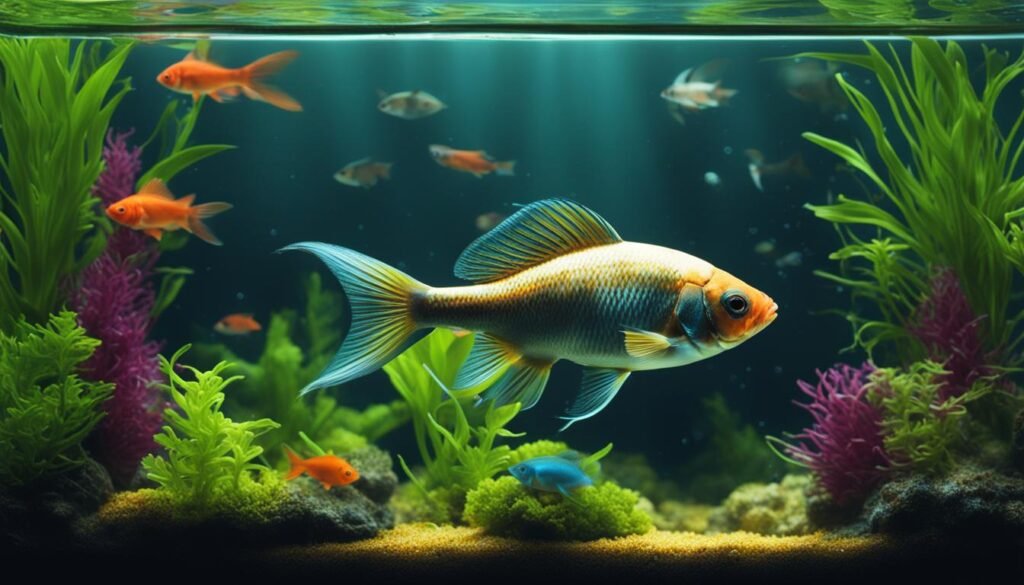
By implementing these strategies, aquarium owners can significantly increase the lifespan of their fish and provide them with a healthy and fulfilling life in captivity.
Interpreting Lifespan Differences: Wild vs. Aquarium Fish
When it comes to the lifespan of fish, there can be significant differences between those living in the wild and those kept in aquariums. Understanding and interpreting these differences is essential for fish enthusiasts to provide optimal care for their aquarium fish and appreciate the unique challenges faced by wild fish populations.
Wild fish species, in their natural habitats, are subject to various environmental factors and ecological dynamics that can influence their lifespan. These factors include predator-prey relationships, competition for resources, and natural selection pressures. Additionally, wild fish may encounter a range of environmental conditions, such as temperature fluctuations, water quality variations, and the availability of food sources, which can affect their overall health and lifespan.
On the other hand, aquarium fish are generally provided with stable and controlled environments, free from predators and competition. They often receive regular feeding schedules, optimal water parameters, and veterinary care. However, despite these advantages, aquarium fish can still experience reduced lifespans compared to their wild counterparts.
The differences in lifespan between wild and aquarium fish can be attributed to several factors:
- Genetics: Wild fish populations have undergone natural selection processes over generations, favoring those individuals with genetic traits that enhance their survival and resilience. In contrast, aquarium fish are often bred for specific traits, such as color or fin shape, which may not prioritize overall health and longevity.
- Restricted Environment: The confined space of an aquarium can limit the natural movement and behavior of fish. Lack of physical activity and stimulation can lead to stress, obesity, and various health issues, which can ultimately affect their lifespan.
- Dietary Differences: Wild fish have a diverse and varied diet, consuming a wide range of natural food sources. In contrast, aquarium fish are typically fed commercial fish food, which may lack certain nutrients or consist of processed ingredients. Poor nutrition can have long-term effects on fish health and lifespan.
- Water Quality: Although aquarium owners strive to maintain optimal water conditions, fluctuations can still occur, affecting the overall health and lifespan of captive fish. Wild fish, on the other hand, have evolved to adapt to specific water conditions and can often thrive in their natural habitats.
- Stress and Disease: Captive fish can experience stress due to changes in their environment, such as relocation, overcrowding, or inadequate tank maintenance. These stressors can weaken their immune system and make them more susceptible to diseases and infections, thereby shortening their lifespan.
To provide the best possible care for aquarium fish and mitigate the lifespan differences between wild and captive fish, it is crucial to replicate natural conditions as much as possible. This includes providing varied diets, stimulating environments, and monitoring water quality consistently. Regular veterinary check-ups and proper quarantine protocols can also help prevent the introduction of diseases and parasites that can impact fish health and longevity.
By understanding these lifespan differences and the factors that contribute to them, fish enthusiasts can make informed decisions when it comes to caring for their aquarium fish and contribute to the well-being and longevity of these remarkable aquatic creatures.
Extreme Lifespan Anomalies in the Fish World
While most fish species have average lifespans, there are extraordinary cases of extreme longevity in the fish world. These unusual cases involve fish that have lived far beyond the expected lifespan for their species, defying conventional notions of fish longevity. These remarkable lifespan anomalies provide unique insights into the factors that contribute to exceptional longevity in the fish world.
Chart-Topping Lifespans: Rogue Cases in Fish Longevity
In the realm of fish lifespan, some individuals stand out from the crowd with astonishing lifespans that surpass expectations. These chart-topping cases of extreme longevity include fish species that have defied the odds and pushed the boundaries of what is considered normal for their kind.
To illustrate these anomalies, we have compiled a table showcasing some of the most impressive examples of unusual fish lifespans:
| Fish Species | Average Lifespan (years) | Longest Recorded Lifespan (years) |
|---|---|---|
| Japanese Koi | 20-30 | 226 |
| African Lungfish | 10-15 | 80 |
| Greenland Shark | 200+ | >500 |
| Rockfish | 20-40 | 205 |
| Clownfish | 6-10 | 15 |
These extraordinary lifespans challenge our understanding of fish longevity and highlight the remarkable resilience and adaptability of certain species. Through further research and study, scientists hope to unravel the mysteries behind these anomalies and gain valuable insights into the factors that contribute to abnormal fish longevity.
Mother Nature’s Marvels: The Most Prolific Reproducers
Reproduction is a crucial aspect of a species’ survival and can have a significant impact on fish lifespan. In this section, we will explore the most prolific reproducers in the fish world and discuss how their reproductive strategies affect their lifespan. Understanding the relationship between reproduction and lifespan can provide valuable insights into the complex life cycles of fish.
In the remarkable world of fish diversity, some species have evolved extraordinary reproductive strategies that ensure their prolific reproduction. These species exhibit unique adaptations and behaviors that allow them to produce large numbers of offspring, increasing their chances of survival in often challenging environments.
Here are a few examples of the fish species that are renowned for their prolific reproductive abilities:
| Fish Species | Reproductive Strategy |
|---|---|
| Guppies | They possess internal fertilization, and the females can store sperm for extended periods, enabling them to give birth to multiple broods of fry. |
| Atlantic cod | These fish produce an enormous number of eggs, with each female capable of releasing millions of eggs during the spawning season. |
| Clownfish | They engage in a unique reproductive strategy called “sequential hermaphroditism,” where the male can change sex and assume the role of the dominant female if the original female dies. This allows for continuous reproduction within a social group. |
These fish species showcase the remarkable diversity of reproductive strategies in the fish world and highlight the fascinating adaptations that have evolved over time.
By studying the reproductive strategies of these prolific reproducers, scientists can gain insights into the factors that contribute to their lifespan. Reproduction is an energy-intensive process that can affect various aspects of fish physiology, including aging and susceptibility to diseases. Understanding the intricate relationship between reproduction and lifespan is crucial for protecting and conserving these exceptional fish species and their unique reproductive abilities.
Conservation Efforts to Preserve Long-Lived Fish Species
Long-lived fish species play a crucial role in maintaining the balance of aquatic ecosystems. However, they are often vulnerable to environmental changes and human activities that threaten their survival. To ensure the longevity of these remarkable species, conservation efforts are essential.
Conservation initiatives aim to protect and preserve long-lived fish species, safeguarding their habitats and promoting sustainable practices. These efforts involve a combination of scientific research, policy development, and public awareness campaigns.
Conservation is not just about saving individual fish species; it is about preserving the intricate web of life that depends on their existence.
One of the key strategies in fish species conservation is the establishment of protected areas, such as marine parks and reserves, where fishing activities and other harmful practices are restricted. These protected areas serve as sanctuaries for long-lived fish species, allowing them to thrive and reproduce without disturbance.
Additionally, conservation efforts focus on mitigating the impacts of pollution, habitat degradation, and overfishing. By implementing sustainable fishing practices and reducing pollution levels, we can create healthier ecosystems that support the longevity of fish species.
Education and awareness programs play a crucial role in engaging communities and stakeholders in fish species conservation. By promoting the importance of preserving long-lived fish species and the benefits they provide to the environment, these programs encourage responsible actions and foster a sense of stewardship.
Collaboration between scientists, conservation organizations, government agencies, and local communities is vital for the success of conservation efforts. By combining expertise, resources, and knowledge, we can develop comprehensive strategies that address the unique challenges faced by long-lived fish species.
Together, through our collective efforts, we can ensure the preservation of long-lived fish species for future generations to appreciate and cherish. By taking action today, we can protect these remarkable creatures and the valuable role they play in maintaining the health and diversity of our aquatic ecosystems.
The Phenomenon of Aging in Fish: A Scientific Overview
Aging is a universal phenomenon that affects all living organisms, including fish. In order to gain a comprehensive understanding of fish aging, it is essential to delve into the scientific study of the aging process in fish. By examining the mechanisms and factors that contribute to aging, we can unravel the mysteries surrounding fish lifespan and gain valuable insights into the broader study of animal aging.
The aging process in fish involves a complex interplay of genetic, environmental, and physiological factors. Research has shown that genetic factors play a significant role in determining the lifespan of fish. Certain genetic variations can either accelerate or decelerate the aging process, resulting in variations in lifespan among different fish species.
Environmental factors also exert a profound influence on fish aging. The conditions in which fish live, such as water temperature, availability of food, and the presence of pollutants, can impact their lifespan. Scientific studies have demonstrated that fish living in polluted or degraded environments tend to have shorter lifespans compared to those inhabiting pristine habitats.
The study of fish aging has also shed light on the role of physiological factors in the aging process. Metabolic rate, for example, is known to influence the lifespan of fish. Species with higher metabolic rates generally have shorter lifespans, while those with lower metabolic rates tend to live longer.
Understanding the phenomenon of aging in fish has far-reaching implications for both scientific research and the conservation of fish populations. By unraveling the underlying mechanisms and factors that contribute to aging, scientists can explore potential interventions to promote healthy aging in fish populations and mitigate the effects of age-related diseases.
Furthermore, the scientific study of fish aging contributes to our broader understanding of animal aging as a whole. Fish share many physiological and genetic similarities with other animals, making them valuable models for studying the underlying mechanisms of aging in a broader context.
In conclusion, the phenomenon of aging in fish is a subject of great scientific interest. By examining the mechanisms and factors that contribute to fish aging, researchers can gain valuable insights into the broader study of animal aging.
The study of fish aging not only enhances our understanding of fish lifespan but also contributes to our knowledge of aging processes in other organisms. Through continued research and exploration, we can unlock the secrets of aging and facilitate the development of interventions to promote healthy aging in fish populations and potentially beyond.
Conclusion
In conclusion, the world of fish life expectancy is a captivating and intricate realm that encompasses a vast array of species and habitats. Through our exploration of various fish lifespans, the influence of genetics and environment, the impact of captivity and disease, and the extraordinary anomalies in fish longevity, we have gained a deeper understanding of aquatic life cycles and the factors that contribute to fish life expectancy.
By studying the lifespans of different fish species, we can unravel the intricate web of genetic and environmental influences that shape their longevity. This knowledge not only enhances our understanding of these remarkable aquatic creatures but also plays a pivotal role in their conservation and management.
As we continue to dedicate efforts to the conservation of fish populations and conduct further scientific research, we strive to ensure the well-being and longevity of these fascinating aquatic organisms. Through our collective endeavors, we can preserve the delicate balance of aquatic ecosystems and continue to unravel the mysteries of fish life expectancy.
FAQ about How Long Do Fish Live
How long do fish live?
The lifespan of fish varies greatly depending on the species. Some fish live only a few years, while others can survive for decades or even centuries.
What factors influence fish longevity?
Genetics and environmental factors play significant roles in determining the lifespan of fish. Genetic factors can contribute to both longer and shorter lifespans, while the habitat in which fish live also has a profound impact on their longevity.
Do larger fish live longer than smaller fish?
Generally, larger fish tend to live longer than smaller fish. This is due to their lower metabolic rates, which slow down the aging process and increase their life expectancy.
How long do popular aquarium fish live?
The life expectancy of popular aquarium fish such as goldfish, guppies, bettas, and angelfish varies. Goldfish can live for several decades, while guppies typically have a lifespan of 2-3 years. Bettas can live for 2-3 years, and angelfish can live for 10-12 years with proper care.
What is the lifespan of deep-sea fish?
Deep-sea fish have diverse lifespans, ranging from species with short-lived lives to extraordinary longevity of centuries-old giants. The age of deep-sea fish can be determined by studying their otoliths, which are ear bones that record growth and age.
How long do fish live in freshwater ecosystems?
Fish found in freshwater ecosystems have varying lifespans depending on their habitat. Factors such as riverine and lacustrine environments can influence fish longevity.
How long do sharks live?
Shark lifespan varies by species. Some shark species can live for several decades, while others have been known to live for over a century. Understanding shark longevity is essential for their conservation and population management.
Do small fish live as long as larger ones?
While larger fish generally have longer lifespans, there are exceptions among small fish species. Some small fish, such as the world’s smallest fish, can live longer than expected due to unique adaptations and factors that contribute to their longevity.
Are there fish species that have remained unchanged for millions of years?
Yes, some fish species have remained relatively unchanged for millions of years. These evolutionary ancient fish offer insights into the secrets of longevity and contribute to our understanding of aquatic life cycles.
What is the lifespan of juvenile fish?
Juvenile fish have unique lifespan characteristics. Factors such as predation, growth rates, and environmental conditions play a significant role in their longevity during the early stages of their life cycle.
How do diseases and parasites affect fish lifespan?
Diseases and parasites can have a significant impact on the lifespan of fish. Common diseases can reduce life expectancy, while parasites can also shorten fish longevity. Proper strategies for managing and preventing diseases and parasites are crucial for ensuring a longer fish life.
How does captivity affect the lifespan of fish?
The impact of captivity on fish lifespan can vary. While some fish may have shorter lifespans in aquariums, others can live longer if provided with proper care and a suitable environment. Strategies and best practices for increasing the lifespan of fish in home aquariums are available.
Are there differences in lifespan between wild fish and aquarium fish?
Yes, there can be significant differences in the lifespan of fish living in the wild compared to those kept in aquariums. Factors such as diet, habitat, and exposure to predators can contribute to these disparities. Understanding these differences can help fish enthusiasts provide better care for their aquarium fish and appreciate the unique challenges faced by wild fish populations.
Are there any extraordinary cases of fish with long lifespans?
Yes, there are extraordinary cases of fish that have lived far beyond the expected lifespan for their species. These abnormal lifespans provide unique insights into the factors that contribute to exceptional longevity in the fish world.
Does reproduction affect the lifespan of fish?
Reproduction can have an impact on the lifespan of fish. Some fish species that are prolific reproducers may have shorter lifespans due to the energy and physiological demands of reproduction. The relationship between reproduction and lifespan is complex and can vary among different fish species.
How are long-lived fish species conserved?
Long-lived fish species are often vulnerable to environmental changes and human activities. Conservation efforts are in place to preserve the longevity of these fish species. These efforts include habitat preservation, population monitoring, and initiatives to reduce threats to their survival.
What is the phenomenon of aging in fish?
Aging is a universal phenomenon that occurs in fish as well. The aging process in fish involves various mechanisms and factors that contribute to the changes in their physiological and biological functions over time.
Source Links
- https://www.americanoceans.org/facts/how-long-do-fish-live/
- https://nmssanctuaries.blob.core.windows.net/sanctuaries-prod/media/archive/education/voicesofthebay/pdfs/funfacts.pdf
- https://www.fisheries.noaa.gov/national/outreach-and-education/fun-facts-about-fascinating-fish
